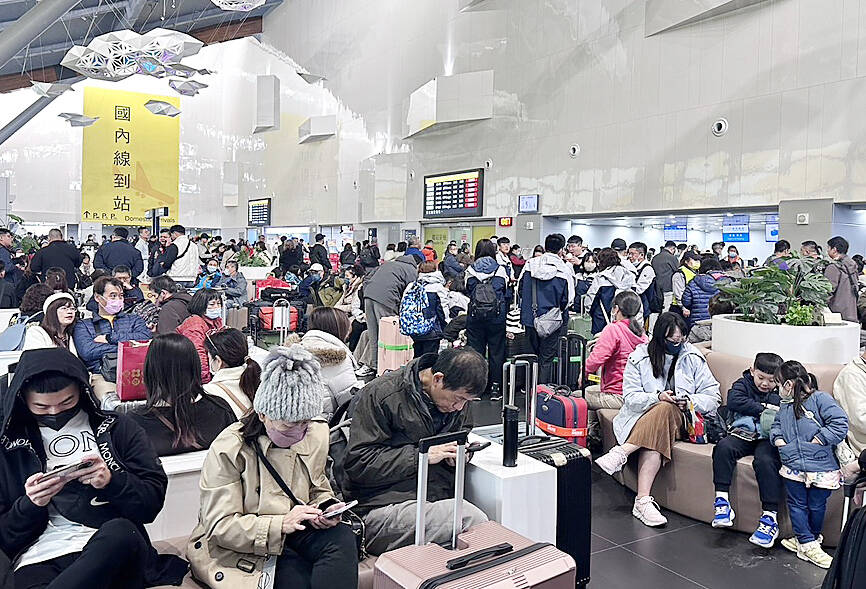A handling fee of up to 30 percent of the total fare could be charged on ticket refunds for domestic flights during long holidays, according to the Ministry of Transportation and Communications’ draft airfare refund rules.
The ministry yesterday announced draft amendments to its Mandatory Provisions to be Included in and Prohibitory Provisions of Standard Form Contract for Domestic Flight Transportation Services (國內線航空乘客運送定型化契約應記載及不得記載事項).
The draft amendments aim to increase cancelation charges for domestic flights during statutory holidays of three days or more, so that air transportation services could be used to their full extent during peak days.

Photo: Chang Hsuan-tse, Taipei Times
The draft amendments stipulate that a cancelation charge of 10 percent of the fare may be levied if the refund is requested at least seven days in advance of the departure day, or 20 percent of the fare if the request is made from one to six days before the departure day.
If the refund is requested ahead of departure on the day, the ticket seller may charge 30 percent of the fare as handling fee.
However, passengers may be exempt from handling fees if they cancel a flight due to family deaths, personal illness or causes to which they cannot be imputed and request refund with relevant supporting documents submitted prior to the departure time.
If they fail to request a refund due to force majeure, ticket sellers may address their request based on the proof they provide.
The draft amendments also stipulate that passengers using concession tickets on domestic flights should provide identity documents while purchasing a ticket and boarding the flight.
For example, residents of outlying islands pay preferential fares for domestic flights, in accordance with the Civil Aviation Act (民用航空法), the Offshore Islands Development Act (離島建設條例) and the Regulations Governing Airfare Subsidies for Offshore Island Residents (離島地區居民航空票價補貼辦法).
They should show their national identity card or household certificate while purchasing a domestic flight ticket or boarding the flight to exercise their preferential right.
They can choose only one preferential program at a time, pursuant to regulations, and may not combine two or more preferential discounts.

The Coast Guard Administration (CGA) yesterday said it had deployed patrol vessels to expel a China Coast Guard ship and a Chinese fishing boat near Pratas Island (Dongsha Island, 東沙群島) in the South China Sea. The China Coast Guard vessel was 28 nautical miles (52km) northeast of Pratas at 6:15am on Thursday, approaching the island’s restricted waters, which extend 24 nautical miles from its shoreline, the CGA’s Dongsha-Nansha Branch said in a statement. The Tainan, a 2,000-tonne cutter, was deployed by the CGA to shadow the Chinese ship, which left the area at 2:39pm on Friday, the statement said. At 6:31pm on Friday,

The Chinese People’s Liberation Army Navy’s (PLAN) third aircraft carrier, the Fujian, would pose a steep challenge to Taiwan’s ability to defend itself against a full-scale invasion, a defense expert said yesterday. Institute of National Defense and Security Research analyst Chieh Chung (揭仲) made the comment hours after the PLAN confirmed the carrier recently passed through the Taiwan Strait to conduct “scientific research tests and training missions” in the South China Sea. China has two carriers in operation — the Liaoning and the Shandong — with the Fujian undergoing sea trials. Although the PLAN needs time to train the Fujian’s air wing and

The American Institute in Taiwan (AIT) put Taiwan in danger, Ma Ying-jeou Foundation director Hsiao Hsu-tsen (蕭旭岑) said yesterday, hours after the de facto US embassy said that Beijing had misinterpreted World War II-era documents to isolate Taiwan. The AIT’s comments harmed the Republic of China’s (ROC) national interests and contradicted a part of the “six assurances” stipulating that the US would not change its official position on Taiwan’s sovereignty, Hsiao said. The “six assurances,” which were given by then-US president Ronald Reagan to Taiwan in 1982, say that Washington would not set a date for ending arm sales to Taiwan, consult

A Taiwanese academic yesterday said that Chinese Ambassador to Denmark Wang Xuefeng (王雪峰) disrespected Denmark and Japan when he earlier this year allegedly asked Japan’s embassy to make Taiwan’s representatives leave an event in Copenhagen. The Danish-language Berlingske on Sunday reported the incident in an article with the headline “The emperor’s birthday ended in drama in Copenhagen: More conflict may be on the way between Denmark and China.” It said that on Feb. 26, the Japanese embassy in Denmark held an event for Japanese Emperor Naruhito’s birthday, with about 200 guests in attendance, including representatives from Taiwan. After addressing the Japanese hosts, Wang